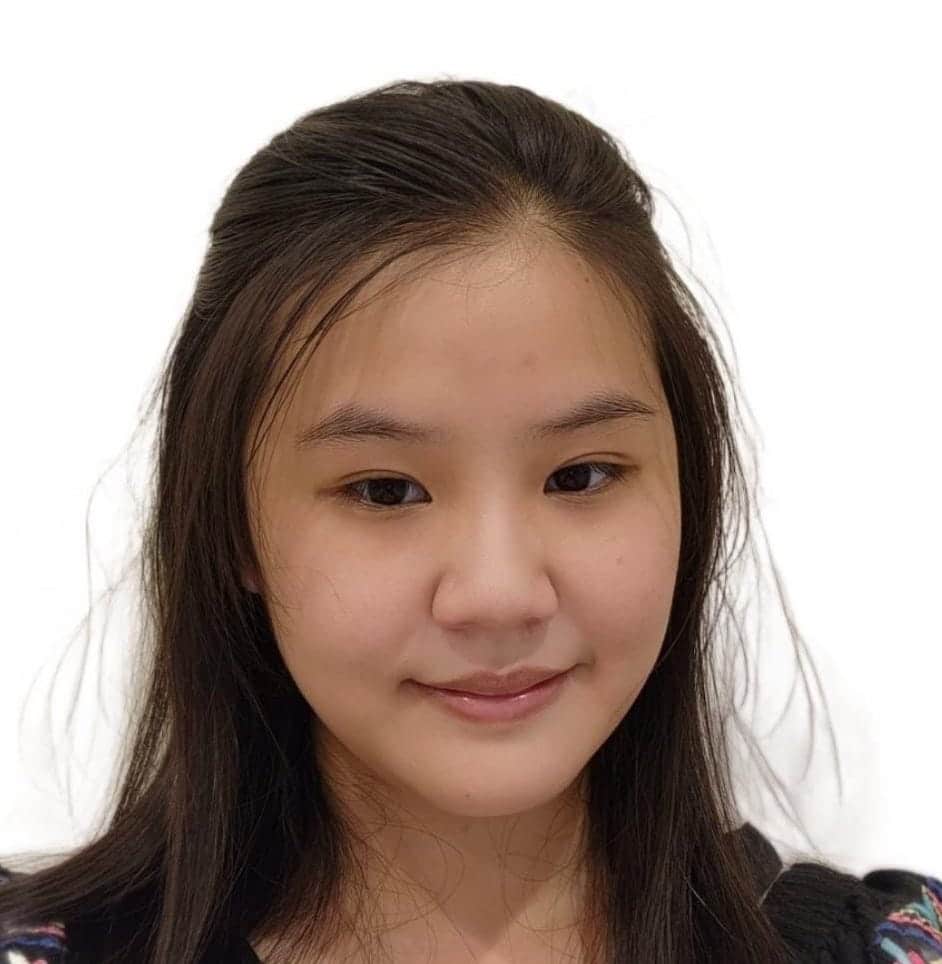5 ways we can help those with special needs strengthen their relationship with Christ
Amanda Ng // November 11, 2022, 3:13 pm
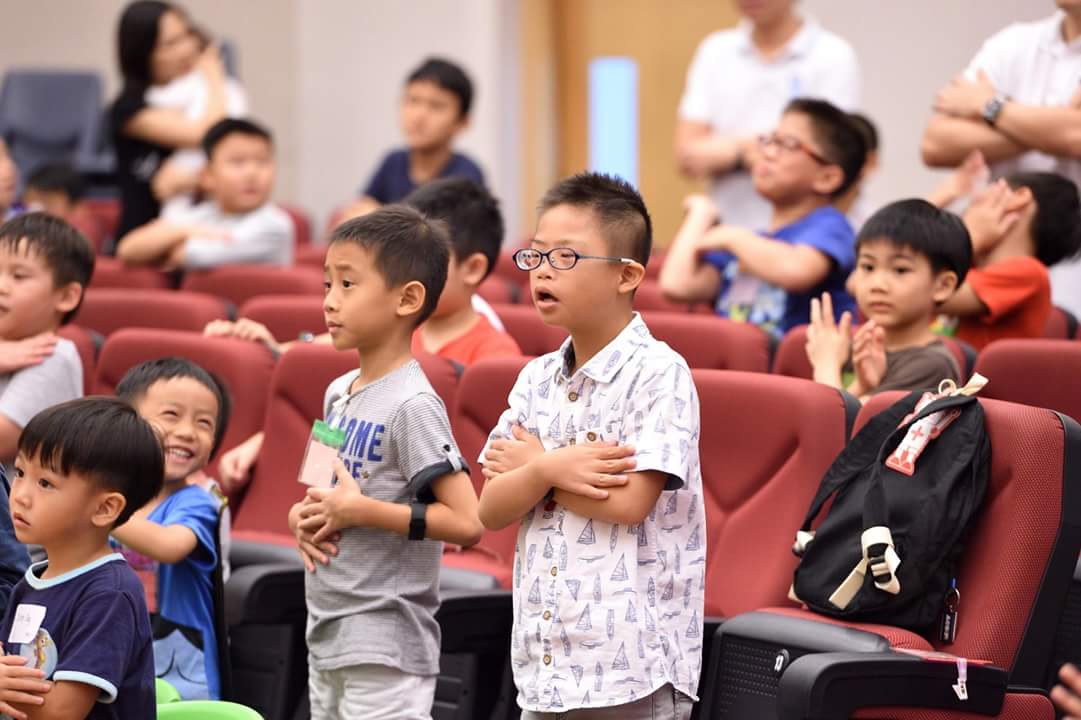
Elliot, 14, who has Down Syndrome, worshipping in church. The dream of his mother, Sherlyn Quek, is to see him serving actively in church one day. Photo from St James Church Superpower Kids' Facebook page.
As Leow Wen Pin shook hands with church congregants after he preached a sermon one Sunday, he tried to put on a smile even though he felt discouraged, as he felt he could have done a better job.
As the congregants filed out of the sanctuary, a woman with an intellectual disability stopped to talk to him, as she did every week.
It was her habit to ask him for a pen, and he would oblige each time. She had been alone after service one day and he had gone to talk to her “a bit out of pity”, said Leow, who is currently a lay pastor at Singapore Life Church.
‘I gave you pens. You gave me dignity as a preacher and reminded me why I’m doing what I’m doing.”
This time, however, the woman did not make her usual request for a pen. Instead, she told him: “I love it when you preach. Look, I took notes.”
Opening her notebook, she revealed a page of words scribbled in child-like handwriting. They were the main points that Leow had made in his sermon.
Choking up with emotion as he recounted the story, the 39-year-old told Salt&Light: “I thought to myself, ‘I gave you pens. You gave me dignity as a preacher and reminded me why I’m doing what I’m doing. I need you more than you need me.’”
This interaction is just one of many that has cemented in Leow a firm conviction that people with disabilities are not burdens or inconveniences, but valuable individuals who are integral to the Church. He is now the chairman of Koinonia Inclusion Network, or KIN, a Christian non-profit he set up in 2019 to educate, equip and train Christian communities in Singapore to better embrace persons with disabilities.
He believes that the Church will be stronger when we embrace and accommodate people with various needs, and learn what it means to love like Jesus did.
If you are a caregiver to or know someone with special needs, here are five ways to encourage him or her to have a meaningful relationship with Christ, regardless of their different abilities.
1. Take them to church
Caleb Heng was diagnosed with Asperger’s Syndrome at the age of 11. Asperger’s Syndrome is a form of Autism Spectrum Disorder (ASD). Neurodevelopmental disorder is characterised by rigid and repetitive thinking patterns, difficulty relating to people socially, and highly-focused interests.
Caleb grew up in a Christian family and has been going to church since he was young.

Caleb Heng is on the autism spectrum but that has not stopped him from enjoying church and developing a strong relationship with God. Photo courtesy of Caleb Heng.
“Being a Christian has helped. If not for my faith in God, I would still be in an emotional tailspin,” he said.
Going to church each week, he sought to have a relationship with Christ. During a youth camp, he “felt on fire for God” during the worship session. Despite his autism, God spoke to him.
“Being a Christian has helped. If not for my faith in God, I would still be in an emotional tailspin.”
“I felt I had a purpose and a love for Him. I wanted to turn my life to Him,” he said.
Caleb got baptised at the age of 14.
Caleb shared that Christ has become his first comfort source, especially during his struggles.
Since then, he has found that worshipping God through music helps him focus when he is “slapped with over-thinking thoughts”.
“When I play Christian songs, I revel in the song and listen to the message God is trying to tell me in the song. I find hope and delight in worship songs.”
Growing up in church gave Caleb the opportunity to learn about Christ and allowed God to touch him.
In another family, Sherlyn Quek, then 32, and her husband struggled when their second son, Elliot, was not only born with Down Syndrome but also had to deal with a host of other health problems, including three holes in his heart and acute myeloid leukaemia.
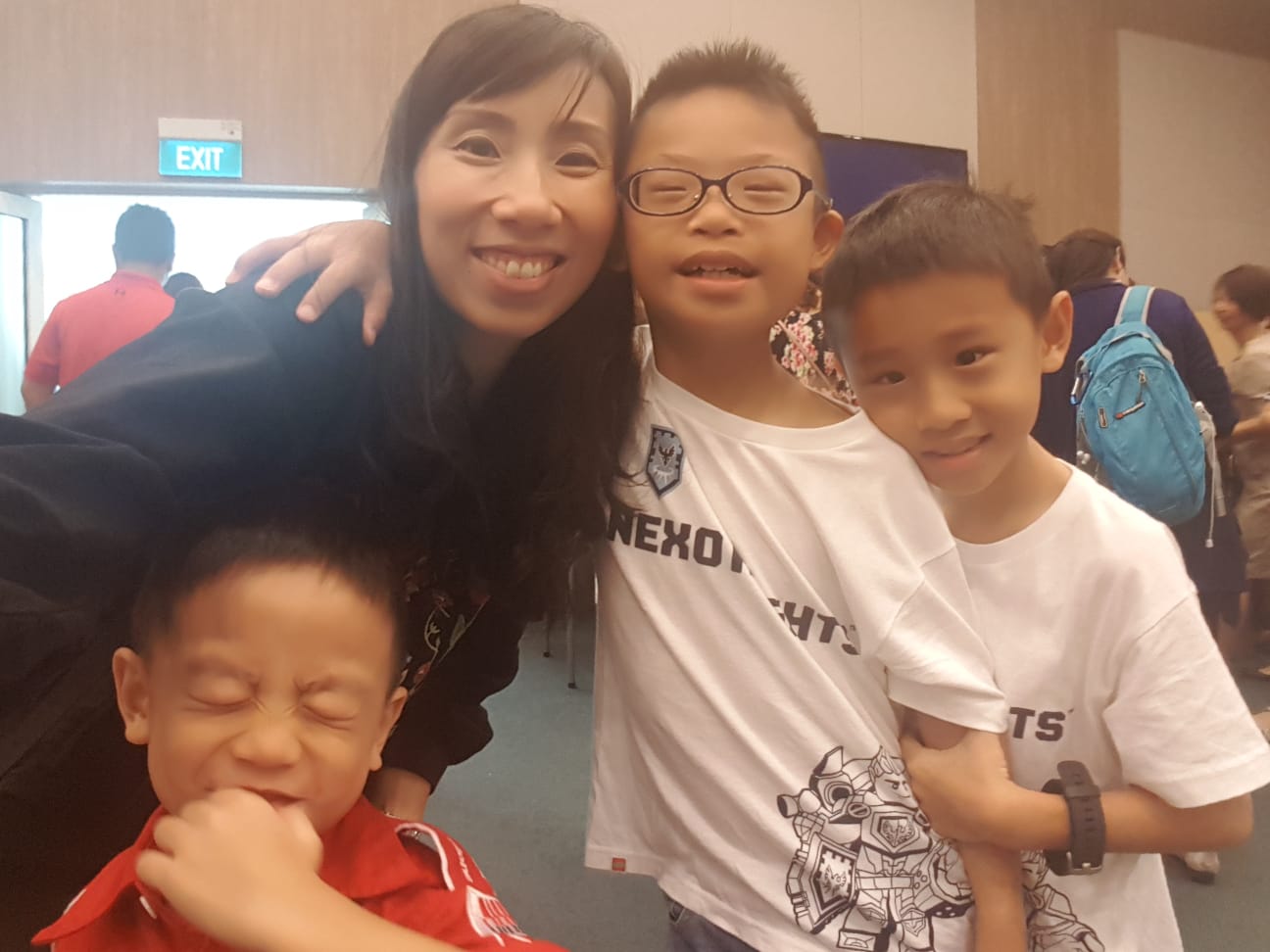
Sherlyn with her three sons, including Elliot (middle). She and her husband also have an older daughter. Photo courtesy of Sherlyn Quek.
However, they found comfort and strength from her cell group and other church friends, who formed prayer groups and surrounded the family with spiritual and practical support through their ordeal.
She recalled them “springing up” at the hospital to donate their platelets, bring them home-cooked meals and take care of their older child, as well as simply offering their company during hospital stays.
“I can’t say this enough, but I’m very thankful that we’re a Christian family,” said Sherlyn.
Elliot, now 15, grew up worshipping in a special service called Superpower Kids, for children with special needs, in St James Church. It is her dream see him serving actively in church one day.
2. Engage them in worship
Just like Caleb, Xin Wei loves worship music. Diagnosed with Autism Spectrum Disorder (ASD) just before his 2nd birthday, Xin Wei is unable to speak in complete sentences. But the first word he uttered was: “Jesus.”

Ling Sheue King (right) with her husband, Goh Kheng Guan, their daughter, Wei En, and son, Xin Wei, who has Autism Spectrum Disorder. Xin Wei loves worship songs and considers Jesus his best friend. Photo courtesy of Ling Sheue King.
“Music is how he connects with God. Sometimes he can wake up and worship God from day till night. He enjoys worshipping God,” said Sheue King, Xin Wei’s mother.
“God has made Himself known to Xin Wei.”
When asked if he loves Jesus, Xin Wei would always answer “yes”. Even though he sometimes gets his “yes” and “no” mixed up, he never does so when he is asked about loving Jesus.
“God has made Himself known to him,” added his mother.
Some of Xin Wei’s favorite songs are Christ is Enough for Me, I Have Decided to Follow Jesus, Jesus You are Beautiful, and Use Me, Jesus.
When Covid struck and all churches were forced to close, Shueu King felt that God was calling her to set up a worship night for special needs children such as Xin Wei.
The belief that music reaches children with autism became the underpinning for Royal Kids. The weekly worship night started on zoom where children with autism gathered for a 30-minute session of worship.
“We started out wanting our children to worship God, to love God. Now, we want our children to give glory to our God,” said Shueu King.
3. Empower them to use their God-given gifts
Isabelle Lim, better known as Issy to family and friends, is profoundly deaf, having been born with Nager syndrome, a rare genetic disorder. There are less than 200 documented cases of the condition, which is characterised by facial and limb deformities.
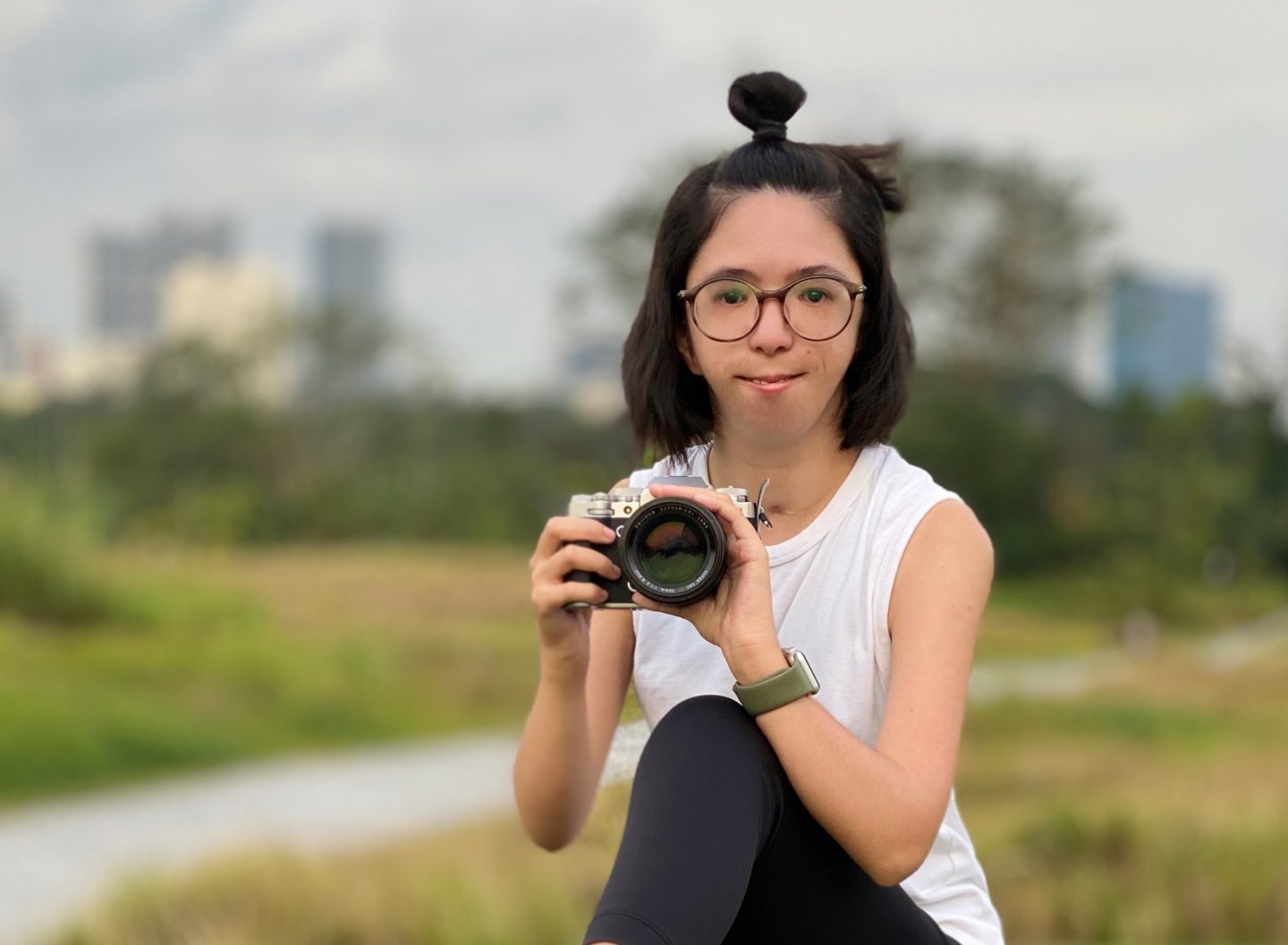
Isabelle Lim was born with Nager syndrome that left her with facial and limb deformities. She is also profoundly deaf. But as a professional photographer, she says: “Every shoot is God-led so I can glorify God through my photography.” Photo courtesy of Isabelle Lim.
Mum Jacqueline is Issy’s interpreter – her ears and voice to the world – and Issy’s support in everything she does.
Since young, Issy was taught to “accept who I am because I am created in God’s image – fearfully and wonderfully made, with a purpose to be an inspiration to others,” said Issy.
“I glorify God through my photography. My pictures are a testimony to God.”
Despite being deaf, Mum Jacqueline and Dad Nick brought Issy up like any other child – they played with her, read to her and taught her her lessons.
“I didn’t want to see her as a child with disabilities. I always see her abilities,” said Jacqueline.
Isabelle Lim, now 28 years old, is a professional photographer.
In every project, Issy is mindful that God is her partner.
“Every shoot is God-led, so I can glorify God through my photography. My pictures are a testimony to God.”
“Every time (I do a project), I pray. I will ask God to give me a vision of what He wants me to capture through my lenses. I will also pray to Him to lead me where He wants me to go at the right moment.”
4. Model the way to prayers
Just like Issy, Amelia Ng, 16 years old, partners with God to pray. Amelia is bedridden and needs to be hooked up to a ventilator 24/7 to be kept alive.
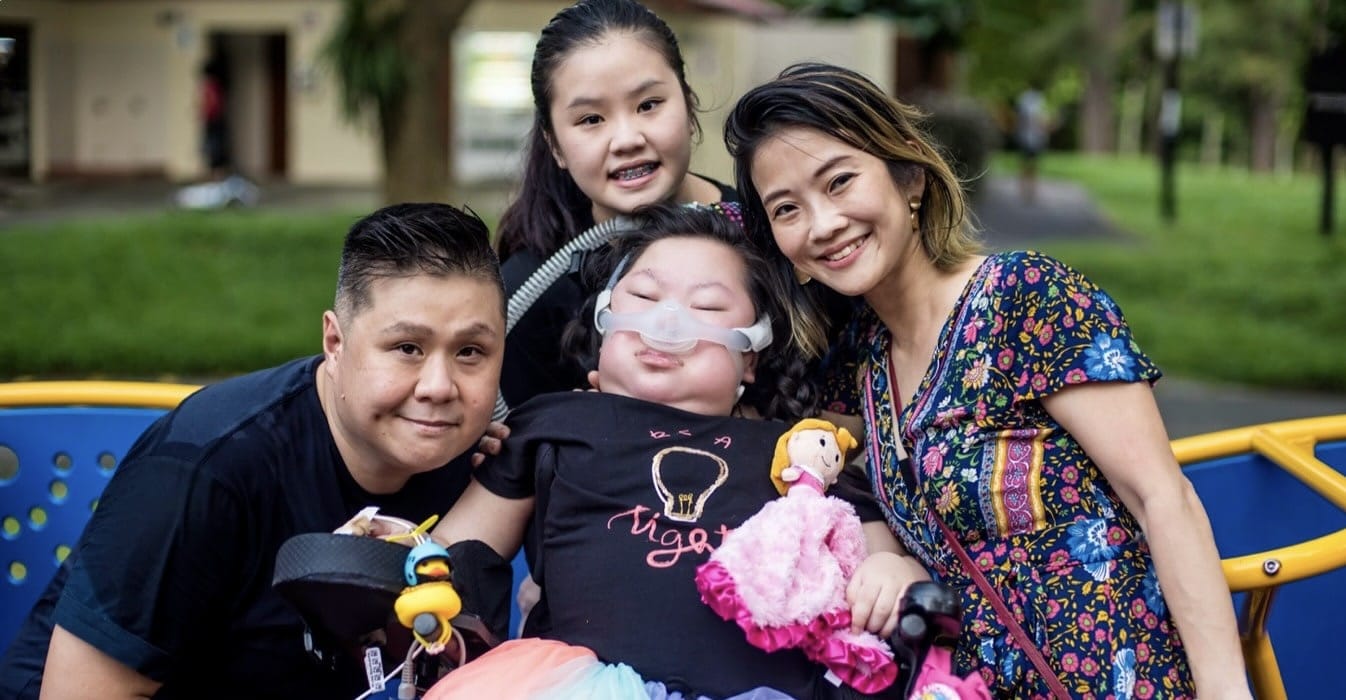
Amelia Ng (in wheelchair) with her parents and sister, Amanda, in a family photo shoot in 2020. Photo courtesy of Amanda Ng.
She has Infantile NeuroAxonal Dystrophy (INAD), which means that she has slowly lost every ability that she once had: Crawling, sitting up, urinating, eating and speaking. There is currently no cure for this progressive and terminal condition.
“She is so entertained and occupied when she prays and talks with God.”
Despite her disabilities, Amelia can still express herself. The swallowing of saliva. The blinking of eyes. The fast fluttering of eyelids. The slight frown on her forehead. The widely-opened eyes. The “mmm-mmm” throaty sounds of vocalisation.
Despite Amelia’s lack of movement and being labelled “non-communicative”, her 19-year-old sister, Amanda, said: “I have noticed that even if she seems to be staring into blank space, she is so entertained and occupied when she prays and talks with God.”
Once, during their weekly family devotion, Mum Wendy, who was leading devotions, asked Amelia who should be in charge of prayers. Through observing her slight responses, Wendy came to the conclusion that Amelia wanted to lead the prayers that evening. She did so non verbally, eventually indicating an “Amen” with her eyes.
Amelia has learnt that being still is more than a lack of movement; it is a state of the mind and the heart.
5. Celebrate their God-given identity
Michael Yeong a 52-year-old pastor at Bethesda Church Bukit Arang (BCBA) was born with cerebral palsy due to a brain injury during his birth. It had been a difficult delivery for his mother, and his twin brother had died at birth.
Cerebral palsy mainly affects his legs, making it hard for him to balance, walk quickly or navigate stairs without railings. He walks with a staggering gait and gets around on a motorised scooter for longer distances.

Pastor Michael Yeong walks with a “staggering gait” because of his cerebral palsy, and has difficulties standing still or using the stairs without railings. But this has not stopped him from serving actively in his church, Bethesda Church Bukit Arang. Photo by Tan Huey Ying.
Despite his disability, he has multiple responsibilities at BCBA – he is in charge of discipleship and Christian education, the family life ministry, the hospitality team, funerals and bereavements, and heads the ministry for the elderly.
“I had to embrace the fact that I am disabled, I am different. I came to a place where I said, ‘I am who I am, and I accept that.’” said Pastor Michael.
“My disability has also taught me lessons that I would otherwise not have learned.”
A Bible verse that sustained him through his years is 2 Corinthians 12:9
“What has considered my weakness is my strength, as I learn to lean on God more and more in the midst of my disability,” he told Salt&Light.
He admits that when he was younger in the Christian faith, he had often wondered if he would be healed of his disability.
“I went for miracle rallies, people prayed for me, and I had hoped that I would be healed. But after some years passed and nothing happened, I began to think that maybe it wasn’t God’s purpose, for whatever reason, to heal me.”
Meanwhile, as he matured in his faith and better understood God’s character, his trust in God’s sovereignty grew.
His physical disabilities did not stop him from the plans that God has set for his life.
Pastor Michael added “Maybe He feels that I can handle the disability. My disability has also taught me lessons that I would otherwise not have learned.”
RELATED STORIES:
How do we enable differently abled persons to be full participants in the community of faith?
Helping children with special needs find their place in the world
We are an independent, non-profit organisation that relies on the generosity of our readers, such as yourself, to continue serving the kingdom. Every dollar donated goes directly back into our editorial coverage.
Would you consider partnering with us in our kingdom work by supporting us financially, either as a one-off donation, or a recurring pledge?
Support Salt&Light